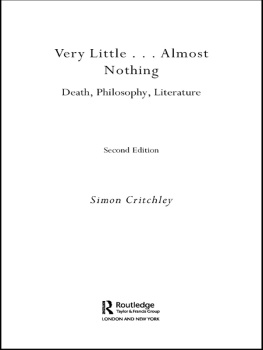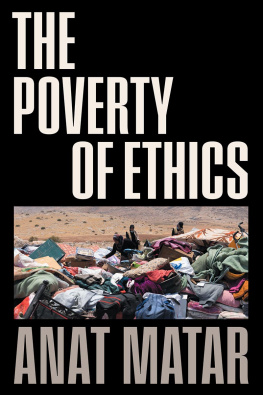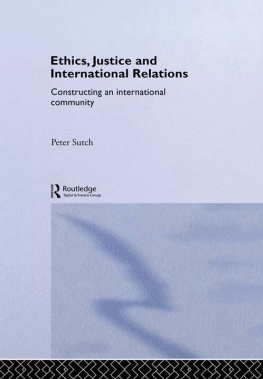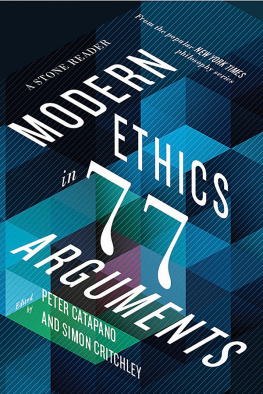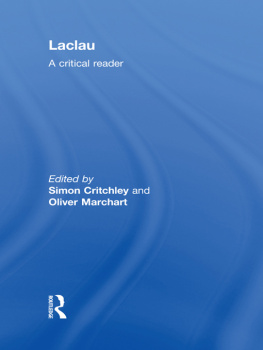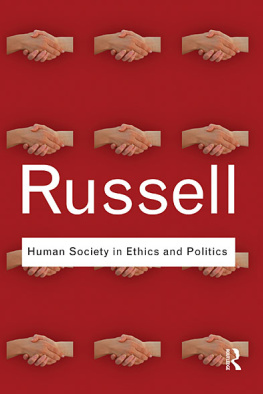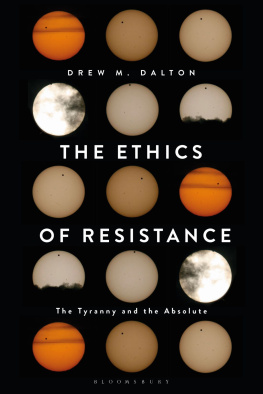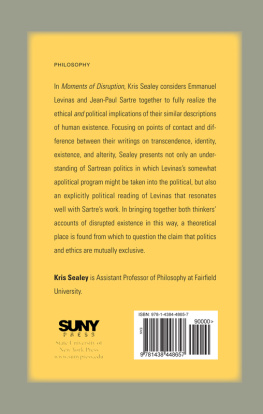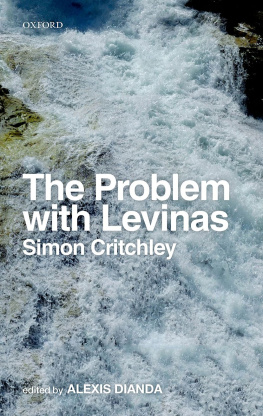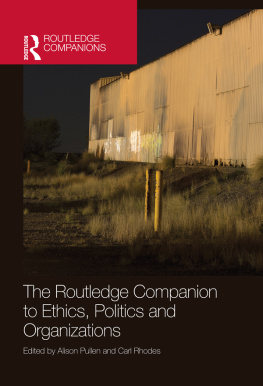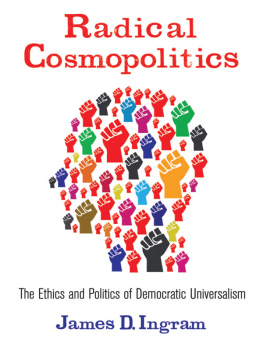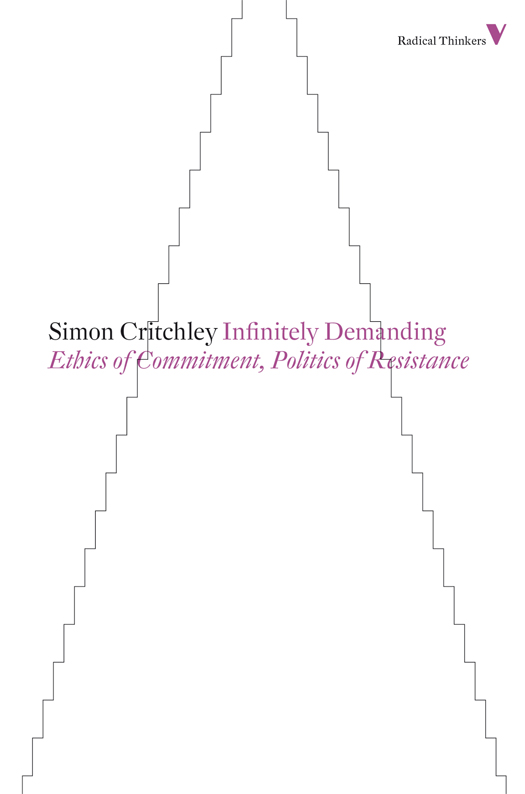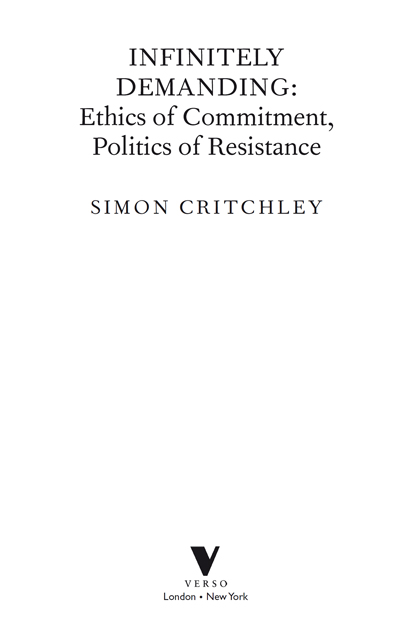Contents

Introduction
The possibility of commitment

Philosophy does not begin in an experience of wonder, as ancient tradition contends, but rather, I think, with the indeterminate but palpable sense that something desired has not been fulfilled, that a fantastic effort has failed. Philosophy begins in disappointment. Although there might well be precursors, I see this as a specifically modern conception of philosophy. To give it a name and a date, one could say that it is a conception of philosophy that follows from Kants Copernican turn at the end of the eighteenth century. The great metaphysical dream of the soul moving frictionless towards knowledge of itself, things-in-themselves and God is just that, a dream. Absolute knowledge or a direct ontology of things as they are is decisively beyond the ken of fallible, finite creatures like us. Human beings are exceedingly limited creatures, a mere vapour or virus can destroy us. The Kantian revolution in philosophy is a lesson in limitation. As Pascal said, we are the weakest reed in nature and this fact requires an acknowledgement that is very reluctantly given. Our culture is endlessly beset with Promethean myths of the overcoming of the human condition, whether through the fantasy of artificial intelligence, contemporary delusions about robotics, cloning and genetic manipulation or simply through cryogenics and cosmetic surgery. We seem to have enormous difficulty in accepting our limitedness, our finiteness, and this failure is a cause of much tragedy.
One could give an entire taxonomy of disappointment, but the two forms that concern me most urgently are religious and political. These forms of disappointment are not entirely separable and continually leak into one another. Indeed, we will see how ethical and religious categories are rightly difficult to distinguish at times, and in my discussions of ethics I will often have recourse to religious traditions. In religious disappointment, that which is desired but lacking is an experience of faith. That is, faith in some transcendent god, god-equivalent or, indeed, gods. Philosophy in the experience of religious disappointment is godless, but it is an uneasy godlessness with a religious memory and within a religious archive.
The experience of religious disappointment provokes the following, potentially abyssal question: if the legitimating theological structures and religious belief systems in which people like us believed are no longer believable, if, to coin a phrase, God is dead, then what becomes of the question of the meaning of life? It is this question that provokes the visit of what Nietzsche refers to as the uncanniest of guests: nihilism. Nihilism is the breakdown of the order of meaning, where all that we previously imagined as a divine, transcendent basis for moral valuation has become meaningless. Nihilism is this declaration of meaninglessness, a sense of indifference, directionlessness or, at its worst, despair that can flood into all areas of life. For some, this is the defining experience of youth witness the deaths of numerous young romantics, whether Keats, Shelley, Sid Vicious or Kurt Cobain, and their numbers continue to multiply for others it lasts a whole lifetime. The philosophical task set by Nietzsche and followed by many others in the Continental tradition is how to respond to nihilism, or better, how to resist nihilism. Philosophical activity, by which I mean the free movement of thought and critical reflection, is defined by militant resistance to nihilism. That is, philosophy is defined by the thinking through of the fact that the basis of meaning has become meaningless. Our devalued values require what Nietzsche calls revaluation or trans-valuation. All the difficulty here consists in thinking through the question of meaning without bewitching ourselves with new and exotic forms of meaning, with imported brands of existential balm, the sort of thing that Nietzsche called European Buddhism although there is a lot American Buddhism around too.
However, this book will be concerned with the other major form of disappointment, political disappointment. In the latter, the sense of something lacking or failing arises from the realization that we inhabit a violently unjust world, a world defined by the horror of war, a world where, as Dostoevsky says, blood is being spilt in the merriest way, as if it were champagne. Such an experience of disappointment is acutely tangible at the present time, with the corrosion of established political structures and an unending war on terror where the moods of Western populations are controlled through a politics of fear managed by the constant threat of external attack. As I try to show in the Appendix to this book, this situation is far from novel and might be said to be definitional of politics from antiquity to early and considerably later modernity. My point is that if the present time is defined by a state of war, then this experience of political disappointment provokes the question of justice: what might justice be in a violently unjust world? It is this question that provokes the need for an ethics or what others might call normative principles that might enable us to face and face down the present political situation. The main task of this book is responding to that need by offering a theory of ethical experience and subjectivity that will lead to an infinitely demanding ethics of commitment and politics of resistance (See ).
Nihilism active and passive
Yet, the latter is not the only option offered up by the present situation. This is why I mentioned religious disappointment and the problem of nihilism. Keeping that problem in mind, the present situation can provoke coherent, but in my view misguided, responses that we might describe as passive nihilism and active nihilism. The passive nihilist looks at the world from a certain distance, and finds it meaningless. He is scornful of the pretensions of liberal humanism with its metaphysical faith in progress, improvement and the perfectibility of humankind, beliefs that he claims are held with the same dogmatic assurance that Christianity was held in Europe until the late eighteenth century. The passive nihilist concludes that we are simply animals, and rather nasty aggressive primates at that, what we might call


